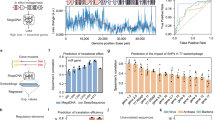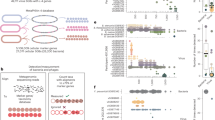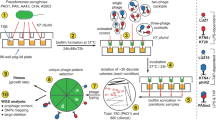Abstract
IT has been shown by Weigle, Meselson and Paigen1 that λ-phage particles able to transduce galactose markers have buoyant densities in cæsium chloride which differ from that of the phage from which they were derived. The altered densities are transmitted to the offspring.
This is a preview of subscription content, access via your institution
Access options
Subscribe to this journal
Receive 51 print issues and online access
$199.00 per year
only $3.90 per issue
Buy this article
- Purchase on SpringerLink
- Instant access to full article PDF
Prices may be subject to local taxes which are calculated during checkout
Similar content being viewed by others
References
Weigle, J., Meselson, M., and Paigen, K., J. Mol. Biol., 1, 379 (1959).
Kaiser, A. D., Virology, 1, 424 (1955).
Jacob, F., and Wollman, E., Ann. Inst. Pasteur, 87, 653 (1954).
Appleyard, R. K., McGregor, J. F., and Baird, K. M., Virology, 2, 565 (1956).
Meselson, M., Stahl, F., and Vinograd, J., Proc. U.S. Nat. Acad. Sci., 43, 581 (1957).
Author information
Authors and Affiliations
Rights and permissions
About this article
Cite this article
KELLENBERGER, G., ZICHICHI, M. & WEIGLE, J. Mutations affecting the Density of Bacteriophage λ. Nature 187, 161–162 (1960). https://doi.org/10.1038/187161a0
Issue date:
DOI: https://doi.org/10.1038/187161a0
This article is cited by
-
Construction and characterization of a tufA-lacZ fusion coding for an E. coli EF-Tu-β-Galactosidase chimeric protein
Molecular and General Genetics MGG (1981)
-
Control of short leftward transcripts from the immunity and ori regions in induced coliphage lambda
Molecular and General Genetics MGG (1973)
-
Electron microscopy of polar insertions in the lac operon of Escherichia coli
Molecular and General Genetics MGG (1972)
-
Target Size of DNA in Ultraviolet Irradiation
Nature New Biology (1971)
-
Mutations of coliphage λ affecting the expression of replicative functions O and P
Molecular and General Genetics MGG (1970)



